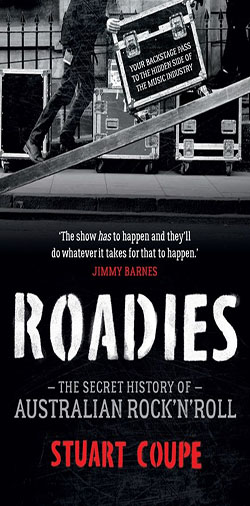 The “Secret History” part could have been easily replaced by “Sex, Drugs, Rock ’n’ Roll and Driving…Lots Of Driving”. There are more miles in Stuart Coupe’s book than a shipping container load of Gregory’s street directories, but it’s much more fun to read.
The “Secret History” part could have been easily replaced by “Sex, Drugs, Rock ’n’ Roll and Driving…Lots Of Driving”. There are more miles in Stuart Coupe’s book than a shipping container load of Gregory’s street directories, but it’s much more fun to read.
The concept is simple: Speak to Australian road crew about their experiences and shape a chapter around each conversation. Do it chronologically. Change very few names to protect the infamous. You can guess a few of them anyway. This boat doesn’t need a lot of rowing. In most cases, the stories tell themselves.
If you’ve ever worked with, alongside, as a payer of or have been reliant on a roadie because you were performing, you’ll know that the good ones are (a.) usually full of war stories and (b.) indispensable. They are, quite simply, the people who make rock and roll shows happen. They see the good, bad and the ugly parts. They know where the bodies (and the drugs) are buried.
Coupe cut his writing teeth on fanzines and magazines and went on to the mainstream press. His writing is matter-of-fact. It’s not flowery; he gets the job done. Importantly, his words deftly underline the critical nature of the roadie’s role. As an artist manager (Hoodoo Gurus, Paul Kelly among others) and promoter in Australian rock and roll’s glory days of the 1980s, he’s been there in the pubs and clubs right, standing next to the crew.
They never appeared on Countdown or in RAM magazine but some of the names mentioned in “Roadies” are legendary. It’s just that their fame is restricted to insiders. If you ever went to a gig in Australia in the ‘70s, ‘80s and ’90s, the chances are that you crossed paths with them. You just didn’t know it.
Maybe you were in a support band where you had to lug a PA in and out or forfeit your fee. If so you might recall one of these guys - because with a few exceptions, they were male - threatening to rip you a new one for dragging your sorry arse too slowly under the weight of a W-Bin, or a traps case without wheels. Some were real pricks (I’m looking at you, Radiators crew) and others had a bark worse than their bite. If you had just half an inkling of how things worked, you knew that even the arseholes deserved respect.
This is a rare thing - a music book where the headlining acts are reduced to bit players. It’s a function of the subject: the focus is backstage, at the lighting and mixing desks and on the interminable drives between one venue and the next.
Drugs and booze are almost a universal given - a means unto an end of getting to the next gig - until we get to the present day where the average roadie is more likely to be a young dude with software obsessions than a sparky in a black T-shirt with homemade tattoos.
“Roadies” starts in the era of Col Joye and the Joy Boys where the crew was “one man, one van”, through the days of beer barns and touring acts with semi-trailers, It ends in the more clinical times of dance music acts, programmed lighting rigs and laptops.
Like almost every industry over the last 50 years, digital disruption has wrought change. The life’s still tough but road crew on speed, staying up for three nights straight and taking the edge off with booze as they drove manically between shows in cities 500 kilometres apart, are long gone.
Women are finding a place in the job. Some of the most insightful comments about managing people come from Leesa Ellem, longtime tour manager for You Am I. Debauchery is doubtless still occurring, but is discreetly positioned under the radar rather than being regular tabloid media fodder.
It’s not all black label booze, football field-length lines of cocaine and beautiful groupies. Coupe tells the tales about addiction, mental health problems and suicide as well. Physical injuries, too, are par for the course. OH & S might as well have been the name of a law firm.
The road is a harsh mistress and there’s no shortage of mortality in these pages, but also a focus on the way the industry is trying to look after its own. Ultimately, "Roadies" is entertaining and mostly uplifting. It's a story well told about real characters for whom life on the road is less of a job than a calling. 

